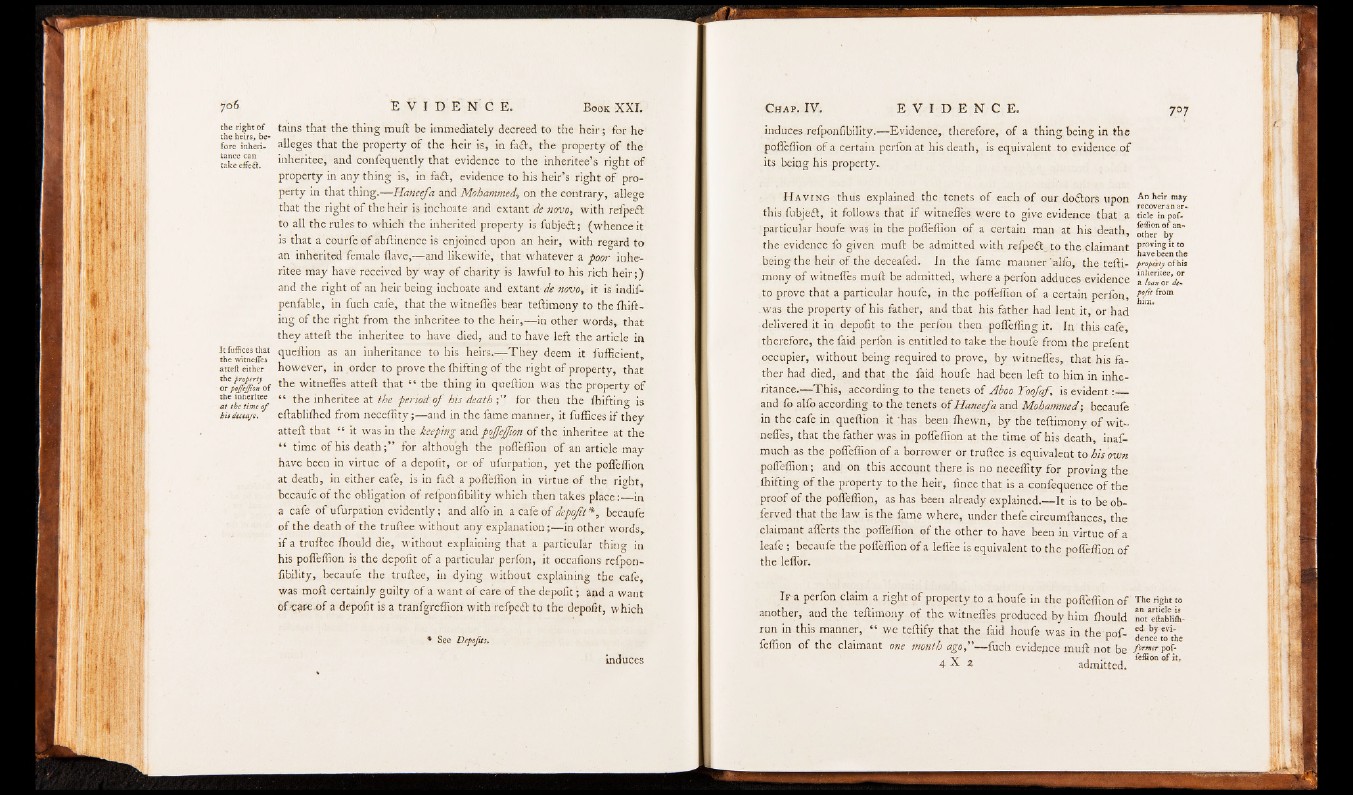
the right o f
the heirs, be*
fore inheritance
can
take effedl.
Itfuffices that
the witnefles
atteft either
the property
or pojfejjton o f
the inheritee
a t the time o f
h it deceaje.
tains that the thing muft be immediately decreed to the heir ; for he
alleges that the property of the heir is, in fact, the property of the
inheritee, and confequently that evidence to the inheritee’s right of
property in any thing is, in fa£t, evidence to his heir’s right of property
in that thing.—Haneefa and Mohammed, on the contrary, allege
that the right of the heir is inchoate and extant de novo, with refpeét
to all the rules to which the inherited property is fubjedt ; (whence it
is that a courfe of abftinence is enjoined upon an heir, with regard to
an inherited female Have,—and likewil'e, that whatever a poor inheritee
may have received by way of charity is lawful to his rich heir;)
and the right of an heir being inchoate and extant-ai? novo, it is indif-
penfable, in fuch cafe, that the witnefles bear teftimony to the fluffing
of the right from the inheritee to the heir,—in other words, that
they atteft the inheritee to have died, and to have left the article in
queftion as an inheritance to his heirs,—They deem it fufficient,
however, in order to prove the fluffing of the right of property, that
the witnefles atteft that “ the thing in queftion was' the property of
“ the inheritee at the period o f his death for then the fhiftino- is
eftablifhed from neceflity ;—and in the fame manner, it fuflnces if they
atteft that “ it was in the keeping and poffeffion of the inheritee at the
“ time of his death;” for although the pofl'effion of an article may
have been in virtue of a depofit, or of ufurpation, yet the pofl'effion
at death, in either cafe, is in fact a pofleffion in virtue of the rioht,
becaufe of the obligation of refponfibility which then takes place :—in
a cafe of ufurpation evidently ; and alfo in a cafe o î depoft*, becaufe
of the death of the truftee without any explanation ;—in other words,
if a truftee fhould die, without explaining that a particular thing in
his pofleffion is the depofit of a particular perfon, it occafions refponfibility,
becaufe the truftee, in dying without explaining the cafe,
was moft certainly guilty of a want of care of the depofit ; and a want
of care o f a depofit is a tranfgreffion with refped to the depofit, which
* See Depojits.
induces
induces refponfibility.—Evidence,, therefore, of a thing being in the
pofleffion of a certain perfon at his death, is equivalent to evidence of
its being his property-
H aving thus explained the tenets of each of our doctors upon An heir may
• . r . . • r i t • r r . . ■ recover an arthis.
lubject, it follows that if witnefles, were to give evidence that a ticlempof-
particular houfe was in the pofleffion of a certain man at his death., otheTby3"'
the-evidence fo given muft be admitted with refpeft to the claimant
being the heir of the deceafed. In the fame manner alfo, the tefti- of his
mony of witnefles muft be admitted, where a perfon adduces evidence a/»«"or st-
, to prove that a particular houfe, in the pofleffion of a certain perfon,
.\vas the property of his father, and that his father had lent it, or had
delivered it in depofit to the perfon then poflefting it. In this cafe,
therefore, the faid perfon is entitled to take the houfe from the prefent
occupier, without being required to prove, by witnefles, that his father
had died, and that the faid houfe had been left to him in inheritance.—
This, according to the tenets, of Aboo Toofaf, is evident:__
and fo alfo according to the tenets of Haneefa and Mohammed-, becaufe
in the cafe in queftion it/has been. fhewn, by the teftimony of witnefles,
that the father was in poffeffion at the time of his death-, inaf-
much as the pofleffion of a borrower or truftee is equivalent to his own
pofleffion; and on this account there is no neceflity for proving the
fhifting of the property to the heir, fince that is a confequence of the
proof of the pofleffion, as has been already explained.—It is to be ob-
ferved that the law is the fame where, under thefe circumftances, the
claimant aflerts -the pofleffion of the other to have been in virtue of a
leafe; becaufe the pofleffion of a leflee is equivalent to the pofleffion of
the lefior.
Ip-a perfon claim a right of property to a houfe in the pofleffion of The right to
another, and the teftimony of the witneffes produced by him fhould not^ftabuth-
run in this manner, “ we teftify that the faid houfe was in the Dof- £,d' by evir
r r c i_ i • . , , _ , . dence to the lemon or the claimant one month -—fuch. evidence muft not be f ormeri?ofm
B v I , feffion o f it, 4 A 2 admitted.